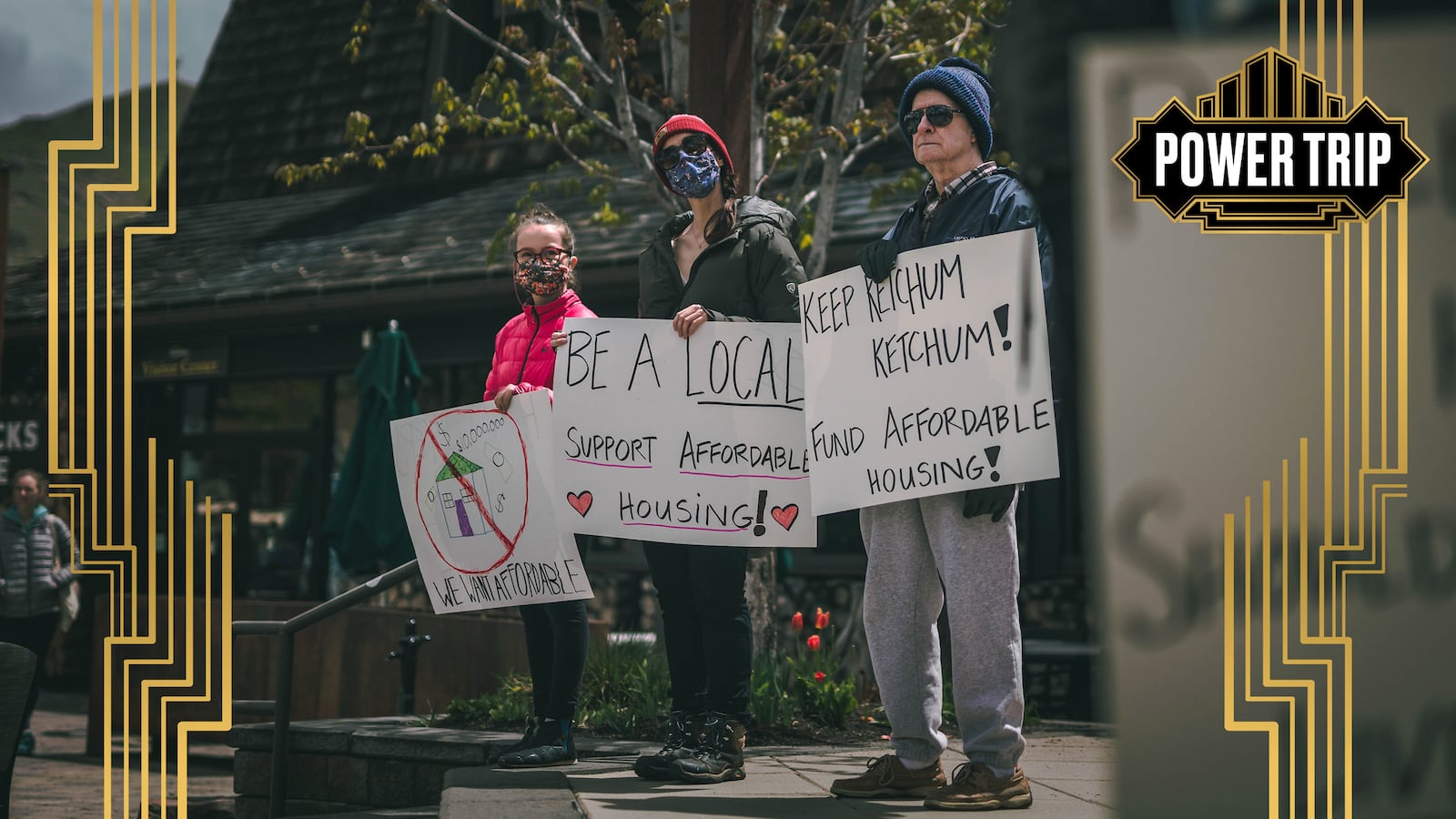Affordable housing in Ketchum—the Idaho resort community adjacent to billionaire and celebrity playground Sun Valley—has been a problem for decades.
But the situation is becoming so dire in the wake of COVID-19 that city officials are considering an unusual range of quick fixes—including building tent cities and RV parks for the common folk in the ultra-rich mountain town, where the median home listing price is hovering above $900,000.
Residents and housing activists say their friends and neighbors, some whose families have lived in Ketchum for generations, are being priced out as landlords sell buildings to well-heeled buyers and out-of-town investors. The problem is exacerbated, they say, by property owners renting homes for a bigger profit on sites like Airbnb to short-term remote employees escaping Silicon Valley and big cities.
“There’s a joke going around: you either have three houses in Ketchum or three jobs,” said Kris Gilarowski, a hospitality worker and father of two who recently launched a Facebook group titled Occupy Ketchum Town Square to address the housing crisis.
And those losing homes and apartments aren’t just service industry workers, but teachers, nurses, and other professionals who are fast becoming the hidden homeless in the picturesque city of roughly 2,800 people.
“I think the people who have three jobs don’t have time to write a letter to the editor or go to a city council meeting,” Gilarowski told The Daily Beast. “It got me thinking that you need to get these people involved, because if they don’t come out, a solution won’t happen.”
As local TV station KTVB reported, some temporary housing solutions weighed by city officials include “a plan to allow Ketchum’s nurses, teachers, and service workers to sleep in tents in the city park as rent and housing costs continue to soar out of their grasp.”
The discussions come at a time when one developer is seeking approval for an affordable housing complex downtown called Bluebird Village but facing backlash from residents who claim the building will be an eyesore and absorb valuable parking spaces.
They also follow another developer’s $9 million sale of an affordable apartment building called KETCH, leaving residents unable to pay new rates imposed by the new landlord. (At a recent city council meeting, one KETCH resident said the new owner increased rents by 50 to 60 percent. “He wants me to be paying $1,700 for 425 square feet. It’s insane, it shouldn’t have happened,” the woman said.)
“One of the biggest oppositions to Bluebird and any affordable housing, really, was aesthetics,” Reid Stillman, a mayoral candidate who works in advertising and is scrambling to find rental housing himself, told The Daily Beast. “That is so embarrassing when we’re dealing with human lives.”
“We have this older generation worried about the look and color of the brick of the building,” Stillman added. “What they don’t understand is these are the people that serve them food, sell them clothes, bag their groceries… and you’re not allowing them to have affordable places to live because you're worried about the color of brick in town.”

Affordable housing has become a crisis in Ketchum, Idaho, where the middle class is struggling with skyrocketing rents and home prices as wealthy buyers flood into town.
Courtesy Gary HoffmanMeanwhile, Gilarowski said he’s heard from long-term residents who received notices of rent hikes anywhere from $600 to $1,500—and one well-paid hospital worker lived in his car for three weeks because he couldn’t find a place to live.
Gilarowski shared another horror story at a special city council meeting last month to address the crisis: A couple was living in a tent in Sawtooth National Forest for 94 days through January before they found affordable housing.
“I do support the city of Ketchum opening up some public spaces, so people could temporarily park an RV, pitch a tent, because then we can’t hide from these people,” Gilarowski said at the meeting. “These are the people that work at your school. These are the people that work at your local business. These are the people that serve you. I know some of you put up your $8 million houses … but you don’t have compassion for working class people. You say you’re for community housing but ‘not this project, not that project…’”
In an interview with The Daily Beast, Gilarowski alluded to the wealth infused in Ketchum and neighboring Sun Valley, including Allen & Co.’s annual media conference, sometimes referred to as a “summer camp for billionaires.” (This year, the guest list includes Facebook CEO Mark Zuckerberg and Amazon mogul Jeff Bezos.)
“There’s so much wealth here and it’s kind of embarrassing to hear that people, families, decide to live for 94 days in a national forest, hidden,” Gilarowski said.
Ketchum Mayor Neil Bradshaw raised a variety of possible solutions to the housing crisis at the council meeting: using city funds to rent hotel rooms this summer and encouraging local residents to rent out spare rooms. He also floated using public lands, including parks or parking lots, for temporary tent sites or RV parking.
Bradshaw said Ketchum’s Rotary Park could house a number of tents, has public restrooms and was across from a YMCA, which has showers. “It would require a certain level of qualification to stay there, so the people would have to show they are working for a local business and contributing to our economy in a certain way. It wouldn’t just be for roadtrippers passing through Ketchum,” Bradshaw told the crowd.
But Stillman blamed Bradshaw and city officials for not acting sooner and called the tent city for nurses and teachers “a joke.”
“We have homeless people,” Stillman countered at the meeting. “They may not be on the street and you may not see them, which is good for you and good for business. But they’re living on couches, they’re in our friends’ houses, they’re in tents up north, they’re camping down south, they’re doing anything they can to get to work here in town.
“We’re not just talking waitresses and waiters,” Stillman added. “We’re talking nurses, and medical supply people, teachers. My best friend works at Montessori school—he’s a teacher, he has nowhere to live.”
Stillman said his own landlord sold his apartment building and he must be out by September. “I make good money and I still can’t find a place,” Stillman said. “So it’s not just affecting one income level … To live in a tent in Rotary Park is a joke especially for people who need WiFi, have to work and have to make a living. That’s a joke.”
“Not only am I going to be homeless with a good job Sept. 1, but my friends who are in the service industry who don’t make a lot of money, they can’t pay $2,900 a month for a two bedroom in Ketchum. This isn’t San Francisco, Neil,” Stillman fumed.
In an interview on Monday, Stillman told us Ketchum suffers from a disconnect among the city’s classes, a situation that stymies action on workforce housing. He said there’s everyday permanent residents who have three to four jobs just to live in the city, second-homers who travel in for vacations, and extremely wealthy people who own a house in Ketchum which they visit only a week or so out of the year.
“Not everyone has a seat at the table,” Stillman said. “I feel our current leader caters to a certain population and there’s not an open line of communication with longterm residents.”
Bradshaw told The Daily Beast that the tent housing was only one idea suggested during a community workshop and bristled at The Daily Beast, and local media, playing up the specter of tent cities. He said Ketchum city planners are also looking into whether elderly homeowners could rent out rooms in their homes in exchange for tenants helping with yard work or other chores, and into altering city code to allow RVs on private property or using federal funds for rental assistance.

An aerial view of the stunning area around Ketchum and Sun Valley, which hosts the annual "billionaire’s camp," the Allen & Company Sun Valley Conference.
Drew Angerer/GettyThe mayor said newer, wealthier residents who fled cities for mountain ski towns during the coronavirus pandemic put pressure on Ketchum’s already limited housing market, driving up rental prices as much as 50 percent.
“We are a small town,” Bradshaw said. “We have seen over the last year, an influx of more people moving to our town due to COVID. COVID has taken what was probably going to happen in 15 years and accelerated it into 15 months.”
“COVID has been the catalyst to amplifying our housing situation,” added Bradshaw, who like others interviewed for this story, noted that for dozens and dozens of help-wanted ads in local press, there’s only a handful of rental advertisements.
“This is so complicated and so nuanced, and it’s happening around the country, it’s not just us,” the mayor continued. “Just like we were during COVID, because we had the highest density of COVID cases per capita at one point, we’re having our little moment of fame here with this idea of affordable housing. But we’re a microcosm of what’s happening around the country.”
The city’s hands are tied, Bradshaw said, because its taxing authority is limited—other hotspots for the uber-rich like Aspen, Colorado, for example, enjoy a real-estate transfer tax that Idaho lacks—and it’s unable to limit Airbnb, VRBO and other short-term rentals because of a 2017 state law.
“We have a very wealthy population and most of them are very supportive of affordable housing although, you know, always wanting something else that’s maybe not quite in their backyard,” Bradshaw said.
In recent months, a retired doctor named Gary Hoffman parked a trailer throughout Ketchum and covered it with a massive sign that declared, “What The One Percenters Ignore: Affordable housing has always been the lifeblood of a vibrant community. A town dies when its most productive people cannot afford to live in it.” Hoffman’s banner also demanded in all caps: “Worker housing now!”
The 79-year-old physician owns a pair of mobile home parks just outside Ketchum and a rental cabin on a 28-acre ranch about 24 miles south of the city.
After the tenant of the cabin announced she was moving out, Hoffman placed a rental ad in the local newspaper, for $650 a month, and received 85 phone calls in 48 hours. “It went to the second person who called. So I had 83 more calls to field,” he said.
The doc saw it as an opportunity to galvanize more residents into fighting for affordable housing. “Everybody I talked to after that, I said, ‘What the hell are you doing to get things changed around here? What are you doing besides bemoaning the fact that we don’t have housing? Are you going to meetings? Are you writing letters to the editor, are you protesting, are you picketing, are you going down to Boise and haranguing the legislators who said Airbnbs and VRBOs are wonderful in resort communities?’”
On Monday, Hoffman was busy doing his own roofing repairs at the mobile home park since he couldn’t find construction workers who were immediately available. “There’s a lot of construction already, everybody who’s got a contracting construction company is working to the max,” Hoffman said.
The mobile home parks are some of the area’s only workforce housing, where tenants pay an average of $550 a month. Many of Hoffman’s tenants work in construction, landscaping or basic clerical work, speak Spanish as a first language, and “do the work nobody else wants to do,” he said.
“People look at the parks I have and they say, ‘My God, you could double your rents.’ People are working, they live there,” Hoffman told us. “Why would I do that if I don’t need the money? And I don’t, so there you go.”


